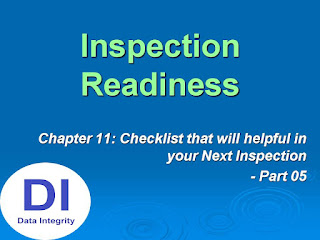- Get link
- X
- Other Apps
- Get link
- X
- Other Apps
 |
| Data Integrity App |
Identify an
Appropriate “On Call” FDA Lawyer:
Long before your next FDA inspection, you should add an FDA
lawyer familiar with the inspection process to the company’s emergency contact
list who can be notified and remain “on
call” once the inspection begins.
This person can serve as a useful resource to help quickly
answer any difficult regulatory or investigator-related questions that arise
during the inspection.
Conduct a Mock FDA
Inspection:
One of the best ways to prepare for a visit from FDA is to
conduct a mock inspection. FDA consultants and/or lawyers can visit your
facility and play the role of the FDA Investigator.
Ask them to review your programs to identify possible
regulatory shortfalls, and work with you to implement strategies that will
strengthen your programs and reduce your regulatory exposure.
Building
and Facilities. Check whether
a. Buildings used in the manufacture or storage of
cosmetics are of suitable size, design and construction to permit unobstructed
placement of equipment, orderly storage of materials, sanitary operation, and
proper cleaning and maintenance.
b. Floors, walls and ceilings are constructed of smooth,
easily cleanable surfaces and are kept clean and in good repair.
c. Fixtures, ducts and pipes are installed in such a
manner that drip or condensate does not contaminate cosmetic materials,
utensils, cosmetic contact surfaces of equipment, or finished products in bulk.
d. Lighting and ventilation are sufficient for the
intended operation and comfort of personnel.
e. Water supply, washing and toilet facilities, floor
drainage and sewage system are adequate for sanitary operation and cleaning of
facilities, equipment and utensils, as well as to satisfy employee needs and
facilitate personal cleanliness.
Equipment. Check whether:
f.
Equipment and utensils used in
processing, holding, transferring and filling are of appropriate design,
material and workmanship to prevent corrosion, buildup of material, or
adulteration with lubricants, dirt or sanitizing agent.
g. Utensils, transfer piping and cosmetic contact
surfaces of equipment are well-maintained and clean and are sanitized at
appropriate intervals.
h. Cleaned and sanitized portable equipment and utensils
are stored and located, and cosmetic contact surfaces of equipment are covered,
in a manner that protects them from splash, dust or other contamination.
Personnel. Check whether:
a. The personnel supervising or performing the activity
or control of cosmetics has the proper education, training and/or experience to
perform the assigned functions.
b. Persons coming into direct contact with cosmetic
materials, finished products in bulk or cosmetic contact surfaces, to the extent
necessary to prevent adulteration of cosmetic products, wear appropriate outer
garments, gloves, hair restraints etc., and maintain adequate personal
cleanliness.
c. Consumption of food or drink, or use of tobacco is
restricted to appropriately designated areas.
“Trust but Verify “ Ronald Reagan
Across the internet, there are millions of resources are available which provide information about Everything.
If you found all content under one roof then it will save your time, effort & you will more concentrated on your important activity.
 |
| Data Integrity App |
Our Data integrity app will helpful for understanding what Data integrity & CSV really means & How 21 CFR Part 11, EU Annex 11 & other regulatory guidelines affects in pharmaceutical Industry.
- Basic Data Integrity Concepts
- ERES & Its Requirement
- CSV & Its best practices
- Mock Inspection and General Q&A
- Checklist for inspection
- Inspection Readiness
- Useful SOP’s
- Stay Regulatory Compliant.
“Stay One Step Ahead in Pharma IT Compliance”
https://play.google.com/store/apps/details?id=com.innovativeapps.dataintegrity
Try our "Data Integrity" app which helps you to better understand current regulatory agencies thinking on Data Integrity & CSV.
Comments
Post a Comment